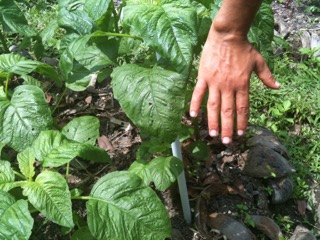Compost Tea
/Have your heard about #compost tea? It’s a concoction that is supposed to supercharge your garden. Does it work? I don’t know and I don’t think anyone can say so definitively. Let me explain why. Recipes for compost tea have been around for a couple of thousand years, but it fell into disuse. Fortunately, we’re experimenting with it again. Trying to figure out how best to make it and how best to use it. Compost tea is not that complicated to make. It’s simply a liquid soil additive that’s made from steeped compost. Here’s some DIY instructions on how to make an aerated compost tea (via the Pennsylvania EPA). It’s also possible to make an anaerobic version. Basic equipment. Start with a 5 gallon bucket, a gallon of mature compost, and a cheesecloth. To aerate it, get an inexpensive aquarium pump, some pump tubing (you can cut it into the lengths you need), and a gang valve (to divide the air supply into several streams).
Put about four gallons of water into the bucket. If you are using tap water, make sure you remove the chlorine before you add the compost to the mixture. How? Let it sit in the bucket overnight or bubble air through it for an hour or so. The chlorine will evaporate. Don’t overfill the bucket. Leave four to six inches of space for bubbles to pop. If you want to accelerate the process add some unsulphured molasses to the mixture. Turn on the air pump and let it run for 2-3 days.
When ready, strain it with a cheesecloth. It should smell earthy. If not, discard it. Return solids to the compost pile. Finally (below), put it to use. So why would you go through the trouble to produce compost tea? On a basic level, compost tea makes the nutrients in the compost more accessible to your plants. In this way, it serves the role of a weak, organic fertilizer that you can apply routinely. That’s useful. The advanced reason is that it is a way to speed up the development of beneficial organisms in your garden. Why? Compost tea is supposed to create a super-colony of bacteria and other organisms that can rapidly set up shop in your soil, to support your plants. Sounds great in concept, however, there’s a problem.
We know almost nothing about the complex web of microorganisms in the soil and in our bodies. It’s very big and very complex system: a healthy human body is the host of a 100 trillion strong bacteria ecosystem that supports and protects us in ways we’re just beginning to learn about.
As a result, it’s going to take some time to figure out.
JOHN ROBB



